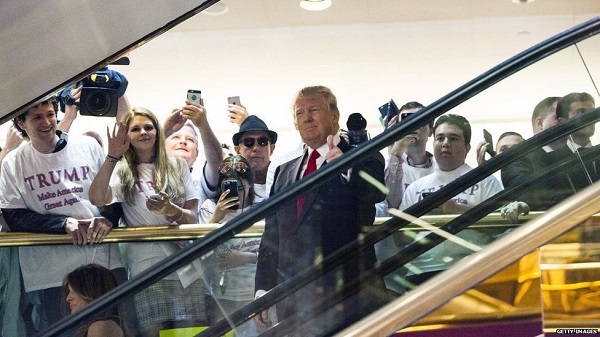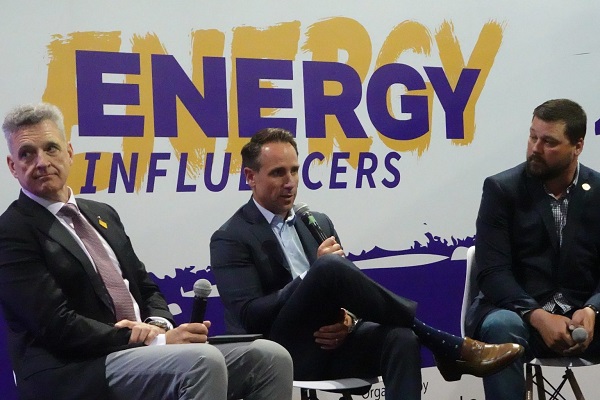Uncategorized
Venezuela opposition urges walkouts to pressure Maduro

CARACAS, Venezuela — Opposition leader Juan Guaido is looking to ratchet up pressure on President Nicolas Maduro with walkouts across Venezuela on Wednesday, just a day after the embattled socialist administration barred Guaido from leaving the country while he is investigated for anti-government activities.
The man challenging Maduro’s claim to the presidency is urging Venezuelans to step outside their homes and workplaces for two hours beginning at noon in the first mass mobilization since he declared himself the nation’s rightful leader a week ago during another round of big protests.
“Venezuela is set on change,” Guaido said.
The surge in political
But Maduro is holding firm in refusing to step down. He oversaw military exercises in recent days while seeking to consolidate support from the armed forces and he is accusing Washington of staging a coup.
In an interview with Russia’s state-owned RIA Novosti news agency on Wednesday, Maduro said he was “willing to sit down for talks with the opposition for the sake of Venezuela’s peace and its future.” Maduro said the talks could be held with mediation of other countries. Russia is one of the staunchest supporters of Maduro and has offered to mediate.
Maduro also accused the U.S. president of ordering a hit on him from Colombia. He said he was aware of Trump’s “orders” for the Colombian government and the local mafia to kill him.
On Tuesday, the Supreme Court barred Guaido from leaving the country after chief prosecutor Tarek William Saab announced that he was opening a criminal investigation of Maduro’s foe, who heads the opposition-controlled congress. Saab is a key Maduro ally and the high court is stacked with Maduro loyalists.
“Once more we’ll come out victorious,” Maduro, dressed in a green cap and shirt, said Tuesday while standing before rows of troops. “We are on the right side of history.”
The court move came after U.S. national security adviser John Bolton warned that the Maduro government would face “serious consequences” if Guaido is harmed.
Guaido has thus far managed to avoid arrest and the Supreme Court did not strip him of his legislative immunity, though the new investigation could signal that Maduro’s administration is moving to take a more punitive approach.
Speaking Tuesday outside the National Assembly, Guaido said he was aware of personal risks.
“I don’t underestimate the threat of persecution at the moment, but here we are,” he said.
The U.S. has emerged as Guaido’s most powerful ally, announcing on Tuesday that it was giving him control of Venezuela’s U.S. bank accounts.
U.S. Secretary of State Mike Pompeo certified that Guaido has the authority to take control of any Venezuelan government accounts at the Federal Reserve Bank of New York or any other U.S.-insured banks. He said the certification would “help Venezuela’s legitimate government safeguard those assets for the benefit of the Venezuelan people.”
On Monday, the U.S. imposed sanctions on Venezuela’s state-owned oil company, Petroleos de Venezuela SA, that could potentially depriving the Maduro government of $11 billion in export revenues over the next year.
Venezuela’s economy is already ravaged by hyperinflation and widespread food and medical shortages that have driven millions of people to leave the country.
Maduro called the sanctions “criminal” and vowed to challenge the U.S. in court. “With these measures, they intend to rob us,” he said.
Violent street demonstrations erupted last week after Guaido during a huge opposition rally in Caracas declared that he had assumed presidential powers under the constitution and planned to hold fresh elections to end Maduro’s “dictatorship.”
Under Venezuela’s constitution, the head of the National Assembly is empowered to take on the duties of the chief executive under a range of circumstances in which the presidency is vacated. The opposition argues Maduro’s re-election last May was a sham.
The previously little-known Guaido has re-invigorated the opposition movement by pushing for three immediate goals: to end Maduro’s “usurpation” of power, establish a transitional government and hold a new presidential election.
The U.S. State Department is telling Americans not to travel to Venezuela, warning of the threat of being arbitrarily arrested or caught in a protest. Venezuela was put on the highest U.S. level advisory, a list that also includes Syria, Afghanistan and Iraq.
The U.N. human rights office says security forces in Venezuela detained nearly 700 people in just one day of anti-government protests last week — the highest such tally in a single day in the country in at least 20 years. It says more than 40 people are believed to have been killed.
Maduro’s allies blame the opposition for the violence and deny the high death toll as well as reports that minors were among those arrested.
Socialist party leaders have been organizing counter-protests by thousands of Maduro supporters in different parts of the country.
On Tuesday, Maduro announced he is expanding Venezuela’s civilian armed militia to 2 million members. The reserve force was created by the late Hugo Chavez to train civilians to assist the armed forces and defend the socialist revolution from attacks.
Maduro vowed never to let the U.S. intervene in Venezuela’s affairs.
“These are moment of history — and battle,” he said.
___
Armario reported from Bogota, Colombia.
Scott Smith And Christine Armario, The Associated Press
Uncategorized
Kananaskis G7 meeting the right setting for U.S. and Canada to reassert energy ties


Energy security, resilience and affordability have long been protected by a continentally integrated energy sector.
The G7 summit in Kananaskis, Alberta, offers a key platform to reassert how North American energy cooperation has made the U.S. and Canada stronger, according to a joint statement from The Heritage Foundation, the foremost American conservative think tank, and MEI, a pan-Canadian research and educational policy organization.
“Energy cooperation between Canada, Mexico and the United States is vital for the Western World’s energy security,” says Diana Furchtgott-Roth, director of the Center for Energy, Climate and Environment and the Herbert and Joyce Morgan Fellow at the Heritage Foundation, and one of America’s most prominent energy experts. “Both President Trump and Prime Minister Carney share energy as a key priority for their respective administrations.
She added, “The G7 should embrace energy abundance by cooperating and committing to a rapid expansion of energy infrastructure. Members should commit to streamlined permitting, including a one-stop shop permitting and environmental review process, to unleash the capital investment necessary to make energy abundance a reality.”
North America’s energy industry is continentally integrated, benefitting from a blend of U.S. light crude oil and Mexican and Canadian heavy crude oil that keeps the continent’s refineries running smoothly.
Each day, Canada exports 2.8 million barrels of oil to the United States.
These get refined into gasoline, diesel and other higher value-added products that furnish the U.S. market with reliable and affordable energy, as well as exported to other countries, including some 780,000 barrels per day of finished products that get exported to Canada and 1.08 million barrels per day to Mexico.
A similar situation occurs with natural gas, where Canada ships 8.7 billion cubic feet of natural gas per day to the United States through a continental network of pipelines.
This gets consumed by U.S. households, as well as transformed into liquefied natural gas products, of which the United States exports 11.5 billion cubic feet per day, mostly from ports in Louisiana, Texas and Maryland.
“The abundance and complementarity of Canada and the United States’ energy resources have made both nations more prosperous and more secure in their supply,” says Daniel Dufort, president and CEO of the MEI. “Both countries stand to reduce dependence on Chinese and Russian energy by expanding their pipeline networks – the United States to the East and Canada to the West – to supply their European and Asian allies in an increasingly turbulent world.”
Under this scenario, Europe would buy more high-value light oil from the U.S., whose domestic needs would be back-stopped by lower-priced heavy oil imports from Canada, whereas Asia would consume more LNG from Canada, diminishing China and Russia’s economic and strategic leverage over it.
* * *
The MEI is an independent public policy think tank with offices in Montreal, Ottawa, and Calgary. Through its publications, media appearances, and advisory services to policymakers, the MEI stimulates public policy debate and reforms based on sound economics and entrepreneurship.
As the nation’s largest, most broadly supported conservative research and educational institution, The Heritage Foundation has been leading the American conservative movement since our founding in 1973. The Heritage Foundation reaches more than 10 million members, advocates, and concerned Americans every day with information on critical issues facing America.
Uncategorized
Poilievre on 2025 Election Interference – Carney sill hasn’t fired Liberal MP in Chinese election interference scandal

From Conservative Party Communications
“Yes. He must be disqualified. I find it incredible that Mark Carney would allow someone to run for his party that called for a Canadian citizen to be handed over to a foreign government on a bounty, a foreign government that would almost certainly execute that Canadian citizen.
“Think about that for a second. We have a Liberal MP saying that a Canadian citizen should be handed over to a foreign dictatorship to get a bounty so that that citizen could be murdered. And Mark Carney says he should stay on as a candidate. What does that say about whether Mark Carney would protect Canadians?
“Mark Carney is deeply conflicted. Just in November, he went to Beijing and secured a quarter-billion-dollar loan for his company from a state-owned Chinese bank. He’s deeply compromised, and he will never stand up for Canada against any foreign regime. It is another reason why Mr. Carney must show us all his assets, all the money he owes, all the money that his companies owe to foreign hostile regimes. And this story might not be entirely the story of the bounty, and a Liberal MP calling for a Canadian to be handed over for execution to a foreign government might not be something that the everyday Canadian can relate to because it’s so outrageous. But I ask you this, if Mark Carney would allow his Liberal MP to make a comment like this, when would he ever protect Canada or Canadians against foreign hostility?
“He has never put Canada first, and that’s why we cannot have a fourth Liberal term. After the Lost Liberal Decade, our country is a playground for foreign interference. Our economy is weaker than ever before. Our people more divided. We need a change to put Canada first with a new government that will stand up for the security and economy of our citizens and take back control of our destiny. Let’s bring it home.”
-

 Business1 day ago
Business1 day agoSenator wants to torpedo Canada’s oil and gas industry
-

 espionage1 day ago
espionage1 day agoFrom Sidewinder to P.E.I.: Are Canada’s Political Elites Benefiting from Beijing’s Real Estate Reach?
-

 Bruce Dowbiggin1 day ago
Bruce Dowbiggin1 day agoFUBAR: How Trudeau & Trump Rewrote This Century’s Political Handbook
-

 Business2 days ago
Business2 days agoRFK Jr. planning new restrictions on drug advertising: report
-

 Alberta2 days ago
Alberta2 days agoAlberta’s carbon diet – how to lose megatonnes in just three short decades
-

 Energy1 day ago
Energy1 day agoWho put the energy illiterate in charge?
-

 espionage1 day ago
espionage1 day agoFBI Buried ‘Warning’ Intel on CCP Plot to Elect Biden Using TikTok, Fake IDs, CCP Sympathizers and PRC Students—Grassley Probes Withdrawal
-

 David Clinton1 day ago
David Clinton1 day agoWhy Are Ontario’s Public Schools So Violent?






